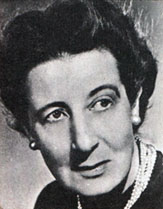Josephine Tey facts for kids
Quick facts for kids
Elizabeth MacKintosh
|
|
|---|---|
 |
|
| Born | Elizabeth MacKintosh 25 July 1896 Inverness, Scotland |
| Died | 13 February 1952 (aged 55) London, England |
| Pen name | Josephine Tey, Gordon Daviot |
| Nationality | Scottish |
| Education | Inverness Royal Academy, Anstey Physical Training College |
| Genres | plays, novels |
Elizabeth MacKintosh (born 25 July 1896, died 13 February 1952) was a Scottish writer. She was famous for her mystery novels and plays. She used two different pen names: Josephine Tey for her novels and Gordon Daviot for her plays. Her detective novel, The Daughter of Time, is considered one of the best crime novels ever written. It explores the mystery of the Princes in the Tower. Her play Richard of Bordeaux was also very popular and starred the famous actor John Gielgud.
Contents
Elizabeth MacKintosh's Early Life
Elizabeth MacKintosh was born in Inverness, Scotland. She was the oldest of three daughters. Her father, Colin MacKintosh, sold fruit. Elizabeth went to Inverness Royal Academy for school. After that, in 1914, she studied at Anstey Physical Training College. This college was in Erdington, near Birmingham, England.
Her Career as a Teacher
After college, Elizabeth taught physical training at different schools. She worked in both England and Scotland. During her school breaks, she also helped as a nurse. She worked at a special home in Inverness for people recovering from illness.
Elizabeth used her experiences from teaching in her books. For example, in her novel Miss Pym Disposes, she described the subjects taught at a physical training school. She also wrote about the types of injuries students might get. She even used a real accident she had, where a gym boom fell on her, as a murder method in that same book!
Returning Home to Inverness
In 1923, Elizabeth moved back to Inverness for good. She returned to care for her mother, who was ill. After her mother passed away that same year, Elizabeth stayed to take care of her father. It was during this time that she started her writing career.
Her Writing Career Begins
Elizabeth's first published work was in a newspaper called The Westminster Gazette in 1925. She used the name Gordon Daviot for this. She continued to write poems and short stories. These were published in other newspapers and magazines.
Early Novels and Plays
Her first novel was called Kif: An Unvarnished History. People liked it a lot, and it sold well in America. This book showed her interest in military topics. Soon after, her first mystery novel, The Man in the Queue, was published. It won an award in America! This book introduced her detective character, Inspector Alan Grant.
Elizabeth's big dream was to have a play performed in London's famous West End. Her play Richard of Bordeaux came true in 1932. It was so successful that it moved to a bigger theater and ran for a whole year! This play made John Gielgud, its young star and director, very famous. Elizabeth and John Gielgud became lifelong friends. She later wrote that her detective, Inspector Alan Grant, had seen Richard of Bordeaux four times!
Elizabeth wrote many other plays, some about history or the Bible. She used the name Gordon Daviot for these. The name Daviot came from a beautiful place near Inverness where she spent happy holidays. However, only a few of her plays were performed during her lifetime.
She also wrote one non-fiction book called Claverhouse. In this book, she defended a historical figure named John Graham, 1st Viscount Dundee. She believed he was a hero who had been unfairly criticized.
Famous Mystery Novels as Josephine Tey
Elizabeth MacKintosh became best known for her mystery novels. She wrote these under the name Josephine Tey. This name came from her great-great-grandmother.
Five of her mystery novels feature Scotland Yard Inspector Alan Grant as the main detective. Her most famous book, The Daughter of Time, is one of these. In this story, Inspector Grant is in the hospital. He has friends help him research old books and documents. He wants to solve the mystery of whether King Richard III really killed his nephews, the Princes in the Tower.
Another novel, The Franchise Affair, also has a historical connection. It's set in the 1940s but is based on a real court case from the 1700s. The Daughter of Time was the last book published while Elizabeth was alive. Her final crime novel, The Singing Sands, was found after she passed away and published later.
Her Final Years
Elizabeth MacKintosh was a very private person. She avoided being in the public eye throughout her life. In her last year, when she knew she was very ill, she even avoided her friends. She passed away from a serious illness on 13 February 1952, at her sister Mary's home in London. Most of her friends, including John Gielgud, did not even know she was sick.
After her death, the money from her books, including future earnings, was given to the National Trust. This organization helps protect important places and spaces in the UK.
Stories on Radio and TV
Many of Elizabeth MacKintosh's books were made into radio shows and television series. Here are some examples:
- The Man in the Queue: A radio show in 1955.
- A Shilling For Candles: Radio shows in 1954, 1963, 1969, and 1998.
- Miss Pym Disposes: Radio shows in 1952 and 1987.
- The Franchise Affair: Radio shows in 1952, 1970, and 2005. It was also a TV show in 1958, 1962, and 1988.
- Brat Farrar: Radio shows in 1954, 1959, and 1980. It was a TV show in 1986.
- The Daughter of Time: Radio shows in 1952 and 1982.
- The Singing Sands: A radio show in 1956 and a TV show in 1969.

